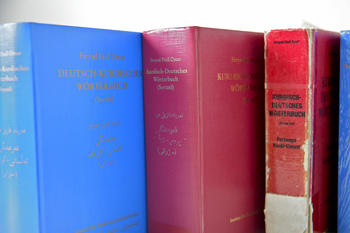“Language is a medium for transmission of culture”
Scholar of Iranian and Kurdish studies at Freie Universität publishes new German-Kurdish dictionary
Jul 15, 2016
Feryad Fazil Omar, a scholar of Iranian and Kurdish studies, has been working at Freie Universität for more than 30 years to support the teaching and study of the Kurdish language and culture.
Image Credit: Marina Kosmalla
Omar has been working on dictionaries of the three main dialects of Kurdish since the mid-1980s.
Image Credit: Marina Kosmalla
Feryad Fazil Omar has been working for more than 30 years at the Institute of Iranian Studies at Freie Universität Berlin to support mutual understanding of the German and Kurdish languages and cultures. The university teacher, who is also the head of the Institute of Kurdish Studies in Berlin and president of the German arm of the Society for Threatened Peoples, recently published his third dictionary.
A Kurd from northern Iraq himself, Omar moved to Berlin in 1978. He has been working within the Kurdish Studies division at Freie Universität since 1982. Campus.leben talked with the scholar and human rights activist.
Mr. Omar, you have published three German-Kurdish dictionaries at this point. What is the difference between them?
The Kurdish language is complicated. The Kurdish people have been divided between different countries since the 17th century, so the language has developed differently in the individual areas. There are three main dialects of Kurdish: Kurmanji (Northern Kurdish), Sorani (Central Kurdish), and Southern Kurdish. Kurmanji is spoken by Kurds in Turkey, in Syria, and in the areas of Iraq and Iran bordering Turkey. Sorani is spoken by Kurds in most of Iraq and Iran, while speakers of the Southern Kurdish dialect live in the south of Iran and Iraq.
The dictionary that was just recently published contains translations from German into Sorani. With about 110,000 headwords, it conveys German thought and the German mindset in Kurdish. The most important words are explained through about 35,000 examples, sayings, and idiomatic expressions. I published the companion volume, Sorani-German, in 2005. My first Kurdish-German dictionary was published in 1992, containing about 35,000 headwords in the Northern Kurdish dialect. I will also be publishing a Southern Kurdish-German dictionary shortly, so the three major dialects will all be covered at that point.
The dictionary is in both Latin and Arabic script. Why?
The Kurdish culture is actually handed down in even more scripts; there are three. This is another area where the differences in how the language and culture have developed due to the division of the Kurdish people are apparent. Kurds in each country use the alphabet that is predominant in that country. In Turkey, since the foundation of the Turkish republic, in 1928, that means the Latin alphabet. In Iran and Iraq, they use the Arabic alphabet, and in Syria they use both. In the former Soviet Union, they even used the Cyrillic alphabet, but it fell out of use in the early 1990s. The Kurds who live there have used the Latin alphabet since then. At the Kurdish Studies division at Freie Universität, we issue our publications in both scripts. We believe it is important for all Kurds, regardless of country, to be able to use this dictionary.
What does working on the dictionaries mean to you?
I am very proud that this dictionary is finally complete after many years of hard work. Language is a medium for transmission of culture. This work communicates not only the language of the Kurds, but also their culture.
When I started working on the first dictionary, in the mid-1980s, the situation looked very grim indeed for the Kurds. Saddam Hussein was in the process of wiping out the Kurdish minority of the Iraqi population, they had no rights in Turkey, they were not recognized as citizens in Syria, and in Iran, their language was officially viewed as a dialect of Persian, or Farsi. So we did here what Kurds were forbidden to do in their home countries – we studied their language and culture and set it down in writing.
What is the current situation for the Kurdish language?
It is experiencing a revival right now. The autonomous region of Kurdistan was established in northern Iraq in 1991. The Kurdish language is taught in schools and at some universities there. There are also many newspapers and magazines published in Kurdish. In Syria, the Kurdish areas are now under Kurdish control for the first time. Kurdish schools are being established there now. In Iran, the language is not taught in schools, but magazines are published in Kurdish.
Are all three dialects of Kurdish taught at Freie Universität?
Kurdish Studies is available as an area of focus at the Institute of Iranian Studies. We offer language classes in Kurmanji and Sorani here every semester, along with seminars on Kurdish literature, history, and linguistics. Every two to three years, a seminar on the southern Kurdish dialects and their literature is offered as well. This is something found nowhere else in Europe, at least not in this form.
What languages and dialects do you speak?
My native language is Sorani, but I am a dialectologist, and I speak and study most Kurdish dialects. Aside from that, I am proficient in the other languages that are important for the region, including Persian or Farsi, Arabic, Ottoman Turkish, Turkish, Azeri or Azerbaijani, and Armenian. I also deal with the Old and Middle Iranian languages, which are hardly spoken today, in my scholarly work. To write a dictionary, you can’t just make do with two languages. You need to have broad language skills.
Further Information
Feryad Fazil Omar, Institute of Iranian Studies, Freie Universität Berlin, Tel.: +49 30-838-5357, Email: feryad-fazil.omar@fu-berlin.de
The volume titled Deutsch-Kurdisches Wörterbuch was published by the Institute of Kurdish Studies in Berlin and is in stock and available for delivery. It is 1,872 pages long and costs 129 euros.


